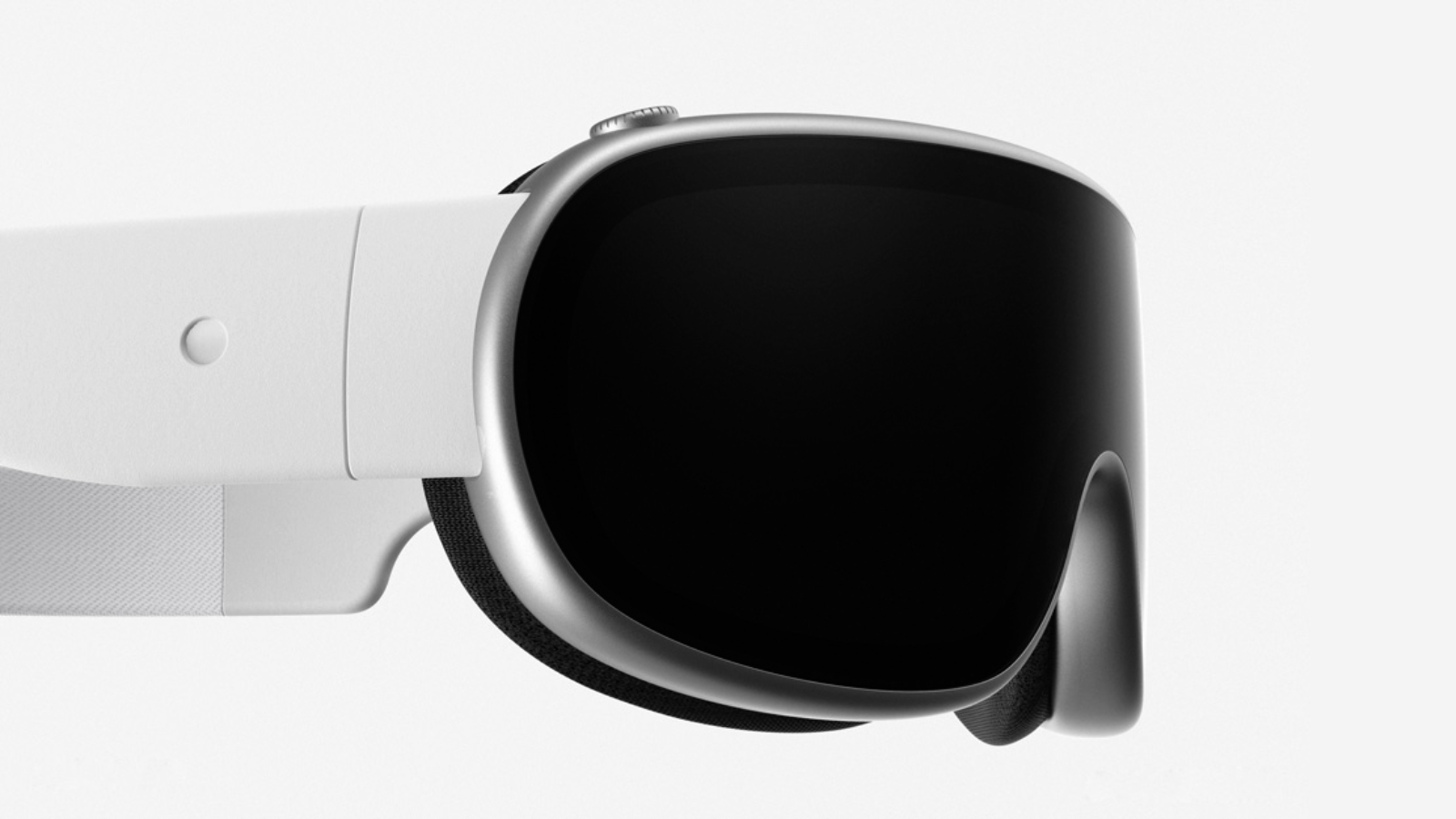05.31.2023
Apple's mixed-reality headset will reportedly be the most complicated hardware product ever made by the company, sporting an unusual design that has proven to be an unprecedented challenging to manufacture,
 Apple headset concept by Marcus Kane
Apple headset concept by Marcus KaneThe headset apparently features an "unconventional curved design, thinness, and ultralight weight." Several renders seen by The Information "show a piece of curved glass with edges wrapped in a smooth aluminum frame that appears to be slightly thicker than an iPhone." The thin profile requires users who wear glasses to buy prescription lenses that magnetically clip into the headset.
Apple had to develop a first-of-its-kind "bent motherboard" to fit inside the headset's curved outer shell. Carbon fiber is used inside the headset to reinforce the structure without adding additional weight.
A small dial is located above the right eye, allowing users to transition between augmented and virtual reality, and a power button is located above the left eye. A round connector that looks similar to an Apple Watch charger attaches to the headset's left temple and runs down via a cable to a waist-mounted battery pack.
The headset's headband is primarily made of a soft material and attached to two short, hard temples which also contain the left and right speakers. A soft, removable cover attaches to the back of the headset for comfort against the wearer's face. Apple is said to have debated adding additional eye-tracking cameras or further adjustments to the motorized lenses to accommodate more face shapes.
Apple's industrial design team apparently pushed for the front of the headset to be made of a thin piece of curved glass, requiring more than a dozen cameras and sensors to be concealed for aesthetic reasons. There have apparently been concerns about the glass warping the images captured by the cameras, which could cause nausea if left unfixed, and the material is more prone to shattering than an iPhone screen due to its shape, leading to worries about broken glass from the headset injuring users.
The design is said to be the main driver behind the device's ~$3,000 retail price. Assembly workers apparently struggle to maneuver tools and install components at awkward angles inside the device due to its shape and densely packed electronics. Testing of the glass housing and cameras also takes far longer than equivalent processes for other Apple devices.
The headset's microOLED displays are also said to be so expensive that Apple has to fix defective units rather than discard them. Sony, the displays' supplier, could struggle to manufacture enough panels for more than 250,000 headsets this year due to their small size and pixel density.
Apple has struggled to build prototype headsets due to its complicated design. At an earlier stage in development, Apple was making 100 headsets a day, but only 20 units were up to the company's standards. In mid-April, the headset underwent design validation testing, where it reportedly remained for an unusually long period compared to more mature products like the iPhone. Apple apparently made unusually late design tweaks as late as April, to make it easier to manufacture.
While mass production of the headset has not yet begun, Luxshare, its sole manufacturer, has purportedly told workers that the factory that will make the headset must be fully staffed by July. The Information believes this points to a launch in the fall or winter. Apple is expected to ship less than half a million headsets during the first year of its release. For more details, see The Information's full report.
Related Roundup: AR/VR Headset
Tags: The Information, Luxshare
Related Forum: Apple Glasses, AR and VR
This article, "Apple's Unusual Headset Design Has Led to Unprecedented Production Challenges" first appeared on MacRumors.com
Discuss this article in our forums
You may also be interested in this
Jony Ive returns to hardw…
07.07.2023
Working for free out of pure love, Jony Ive and his LoveFrom firm tweaked a classic turntable's design for its 50th anniversary. (via Cult of Mac - Tech and culture
iOS 17 is finally tapping…
06.28.2023
Macworld Even for what is reputedly a somewhat smaller-than-usual annual update, iOS 17 still brings with it a host of new features. As the beta process begins, there’s plenty to
iPhone 16 and 16 Pro are …
09.09.2024
Macworld The new iPhones are here, and they’re all about two things: Apple Intelligence and improved camera capabilities. And while Apple is focusing on those things first and foremost, you
Enjoy awesome audio for j…
06.01.2023
If you don’t want to drain your bank account to buy AirPods, why not grab these JBL Tune 220TWS true wireless Bluetooth earphones instead? Treat yourself to a pair for
Apple releases iOS 16.5 a…
05.18.2023
Apple has released iOS 16.5 and iPadOS 16.5 to the public, with the new updates now installable on iPhones and iPads.As WWDC 2023 and the introduction of iOS 17 looms,
15-inch MacBook Air teard…
06.17.2023
Apple's 15-inch MacBook Air has been tore down, revealing its internals that's very similar to its smaller 13-inch sibling. (via Cult of Mac - Tech and culture through an Apple
Geekbench reveals M2 Ultr…
06.13.2023
Geekbench has revealed performance statistics for the M2 Ultra chip inside the 2023 Mac Pro and it has over double the performance of the older Intel-based machine.Geekbench shares stats for
Apple Seeds First Beta of…
04.02.2025
Apple today seeded the first beta of an upcoming macOS Sequoia 15.4 update to developers for testing purposes, with the software coming two days after Apple released macOS Sequoia 15.4.


